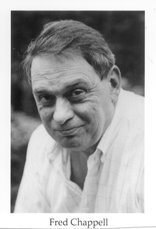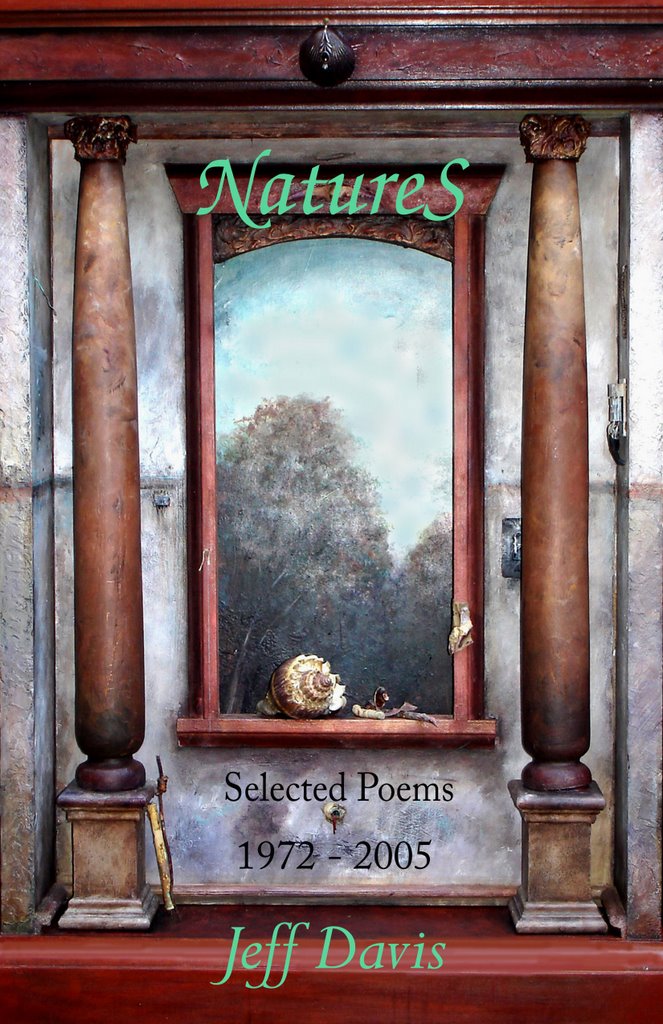A Thanks To Fred Chappell
 By the time you're sixty (or thirty, for that matter) there've likely been occasions when, despite the clearest intentions pursued with focused energy, you've found yourself in a place other than one you intended to reach. There's an unanticipated turn in the path, and you have no option but to take it, regardless, and see where you wind up. One such turn for me involved North Carolina writer Fred Chappell, and because of it, there's a sense in which I owe him real debt of gratitude.
By the time you're sixty (or thirty, for that matter) there've likely been occasions when, despite the clearest intentions pursued with focused energy, you've found yourself in a place other than one you intended to reach. There's an unanticipated turn in the path, and you have no option but to take it, regardless, and see where you wind up. One such turn for me involved North Carolina writer Fred Chappell, and because of it, there's a sense in which I owe him real debt of gratitude.A few weeks ago City Lights Books in Sylva sent out an email about the reading from NatureS scheduled there that mentioned that I had been a student of Fred’s at UNC Greensboro. I had to smile at that, and reflect on the actual circumstance to which City Lights must have had reference. Back in 1967 I was indeed, for a semester, a student in the graduate program in creative writing at Greensboro, a program in which poet and critic Randall Jarrell, one of my favorite poets when I was in my early twenties, had taught for many years. It was still a good program after Jarrell's death, and included on its faculty poets Robert Watson and James Applewhite, novelist Fred Chappell, of course, and others. My fellow students included Robert Morgan and Kay Byer, now Poet Laureate of North Carolina. I don't now remember how many of us there were altogether in the program, but it was a small community, and therefore intense and personal. We, faculty and students, spent time together at parties, in the dining hall, in the Pickwick (a bar a few blocks away from campus), and in each other's homes.
I took Bob Watson’s course in poetry during the spring, and normally would have taken Fred’s course in the fall. But things were not to be normal. Sometime during the few months of that first semester, Fred took a notion that the wife of another faculty member, who shall remain nameless, for obvious reasons, "had a crush" on me, and that this was an intolerable situation. He let it be known that when I took his course in fiction writing in the fall, he would fail me, and so force me from the program. I was dumbstruck and miserable, of course, when I got the news from fellow students (I wanted to be a poet, dammit), but didn't confront Fred, who hadn’t confronted me. Fred had then, in some quarters, a reputation as, shall we say, an ornery, vindictive character. It seems, now, an almost farcical scenario; he would have been, after all, only 30 or 31 in 1967, a bit young to play the patriarchal ogre. But students had few rights in those days; then it seemed that I faced an encounter that for me, a student, age 22, held no possibility of a positive resolution.
The situation was tinted, too, with an appropriate infusion of The Absurd. Whatever the woman might have felt, or not – so subdued was this that I don't think she and I had ever engaged in a conversation that wasn't in public, and she certainly never suggested an attraction – I had not understood her interest, and hadn't reciprocated; in fact, I was obliviously in the grips of a crush of my own, on a woman from New York City whom I found beautiful, exotic, and utterly charming. Ah, if only she had found me equally beguiling ... There's probably still a folder of the anguished poems I wrote her that spring mildewing in a box in the basement.
I left Greensboro for the summer, worked as a VISTA volunteer, and decided somewhere along the way, with more than Fred in mind, not to return to Greensboro. I returned, instead, to Chapel Hill the next spring to finish a course I needed for graduation (Greensboro had accepted me without the BA on the basis of the poems I'd sent them), and in the fall of 1968 headed north to Buffalo, New York.
In Buffalo, I eventually won admission to the State University of New York's wonderful, experimental Program in American Studies. I also found myself in the company of poets who opened for me new possibilities of finding and articulating imagination's forms, possibilities I most likely would not have stumbled upon on my own (and I would have had to find them on my own) had I stayed in Greensboro. In the first two years I was on the Niagara Frontier I audited classes of Robert Creeley's (see an earlier article on Creeley here), and attended readings and parties with Creeley, Allen Ginsberg, Gregory Corso, Robert Bly, James Wright, John Logan, Bob Hass, Richard Brautigan (I loved Trout Fishing in America), and scholar Angus Fletcher, just to mention those whose names surface from memory on this summer afternoon. Some of them were regular guests in the Chenango Street neighborhood I lived in when they were in town. Poet Michael Davidson and his wife Carol lived in the same building. And then there was the music ... Janis Joplin, Buddy Guy, Eric Clapton, Led Zeppelin and hordes of others came through town to warm Buffalo's cold nights. And so much more. It was a rich and fertile field, topsoil twenty feet deep, for a guy who'd grown up in the hard red clay of the small city south, and it became a crucial location in my life.
The point of this is not simply to rehearse some ancient cosmic injustice. It was a situation of no particular moment, in the great scale of things, except – and it’s a big except – that but for it I might not have left the south or developed the approach to poetry that informs my work – or found “my own voice,” as Fred would likely think of it. Bob Morgan once told me that he found in Fred his "perfect reader," someone who understood his writing, as well as what he was writing from, and could help him clarify and articulate his own vision. I found something else, but probably owe him equal thanks, after all.
Sometimes, indeed, the unexpected turn in the path truly does take you to the perfect destination, even if it wasn't the one you set out for.
So, Fred, thanks for the detour.
Labels: Buffalo, Fred Chappell, poets

0 Comments:
Post a Comment
<< Home